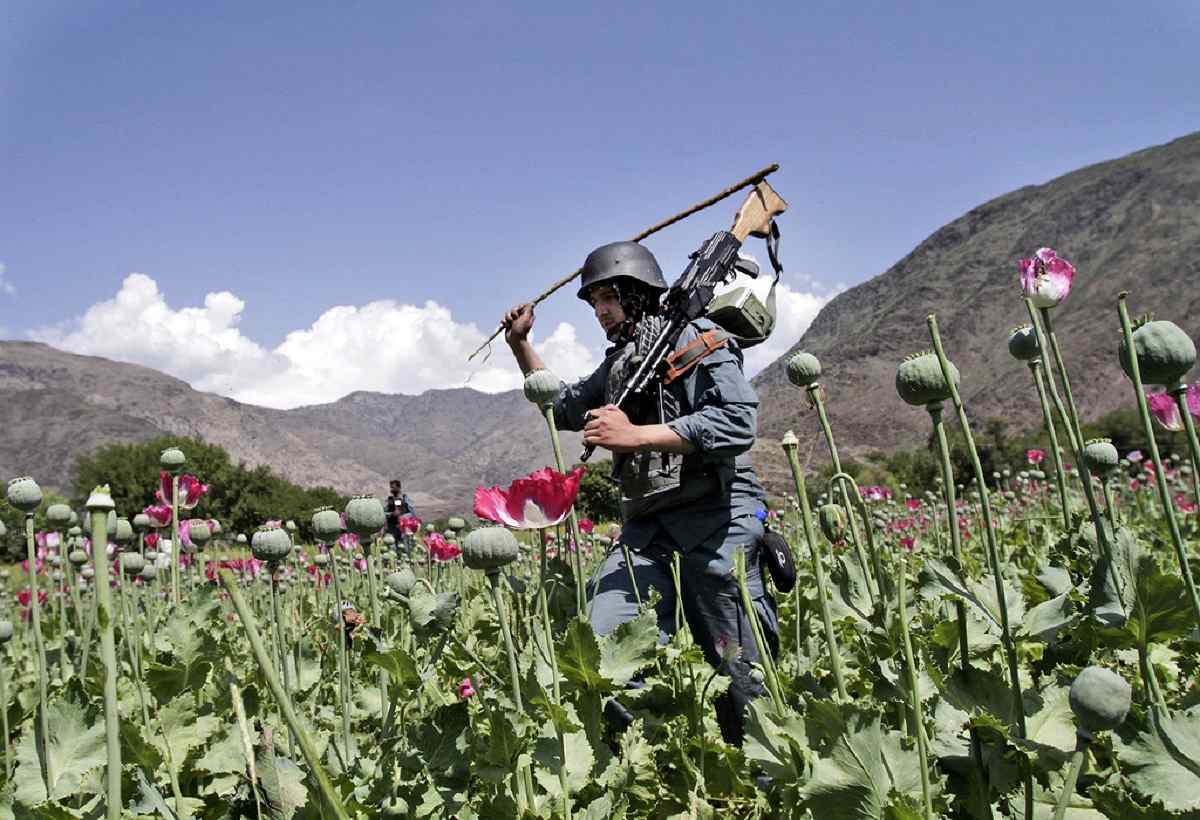Afghan Farmers Lose Income of More than $1 Billion after the Taliban Banned Poppy Cultivation

Armed Afghan policemen destroy an opium poppy field in Noorgal, Kunar province, east of Kabul, Afghanistan on April 13, 2013.
11:10 JST, November 6, 2023
ISLAMABAD (AP) — Afghan farmers have lost income of more than $1 billion from opium sales after the Taliban outlawed poppy cultivation, according to a report from the U.N. drugs agency published Sunday.
Afghanistan was the world’s biggest opium producer and a major source for heroin in Europe and Asia when the Taliban seized power in August 2021.
They pledged to wipe out the country’s drug cultivation industry and imposed a formal ban in April 2022, dealing a heavy blow to hundreds of thousands of farmers and day laborers who relied on proceeds from the crop to survive. Opium cultivation crashed by 95% after the ban, the report from the U.N. Office on Drugs and Crime said.
Until 2023, the value of Afghanistan’s opiate exports frequently outstripped the value of its legal exports. U.N. officials said the strong contraction of the opium economy is expected to have far-reaching consequences for the country as opiate exports before the ban accounted for between 9-14% of the national GDP.
Afghans need urgent humanitarian assistance to meet their most immediate needs, absorb the shock of lost income and save lives, said UNODC executive director, Ghada Waly.
Afghanistan is in dire need of strong investment in sustainable livelihoods to provide Afghans with opportunities away from opium, she said.
Afghans are dealing with drought, severe economic hardship and the continued consequences of decades of war and natural disasters.
The downturn, along with the halt of international financing that propped up the economy of the former Western-backed government, is driving people into poverty, hunger, and addiction.
A September report from the UNODC said that Afghanistan is the world’s fastest-growing maker of methamphetamine, with seizures of the synthetic drug increasing as poppy cultivation shrinks.
Lower incomes along the opiate supply chain could stimulate other illegal activities like the trafficking of arms, people or synthetic drugs, the most recent UNODC report said.
"News Services" POPULAR ARTICLE
-

Japan’s Princess Kako Marks 31st Birthday, Contributed to Key Events This Year
-

Arctic Sees Unprecedented Heat as Climate Impacts Cascade
-

Brigitte Bardot, 1960s Sultry sex Symbol Turned Militant Animal Rights Activist Dies at 91
-

At Least 7 Explosions and Low-Flying Aircraft Are Heard in Venezuela’s Caracas
-
◎竹増ローソン社長インタビュー〔1〕_20251228YGTGS000198_C-250x166.jpg)
Convenience Store Chain Lawson May Start OTC Drug Delivery in 2026
JN ACCESS RANKING
-

BOJ Gov. Ueda: Highly Likely Mechanism for Rising Wages, Prices Will Be Maintained
-

Japan Govt Adopts Measures to Curb Mega Solar Power Plant Projects Amid Environmental Concerns
-

Core Inflation in Tokyo Slows in December but Stays above BOJ Target
-

Osaka-Kansai Expo’s Economic Impact Estimated at ¥3.6 Trillion, Takes Actual Visitor Numbers into Account
-

Major Japan Firms’ Average Winter Bonus Tops ¥1 Mil.


























